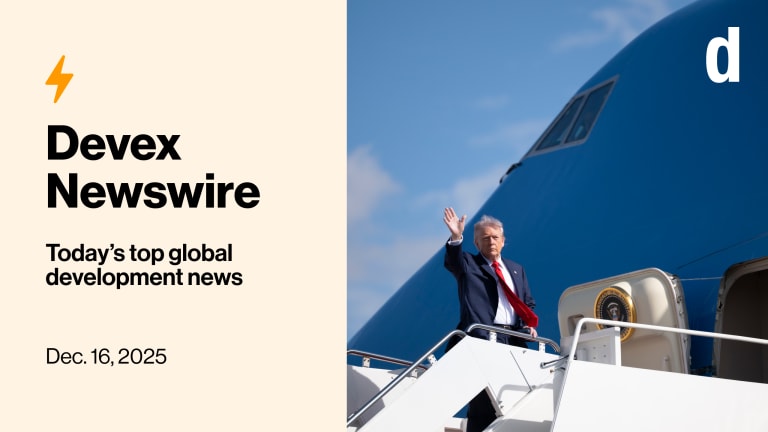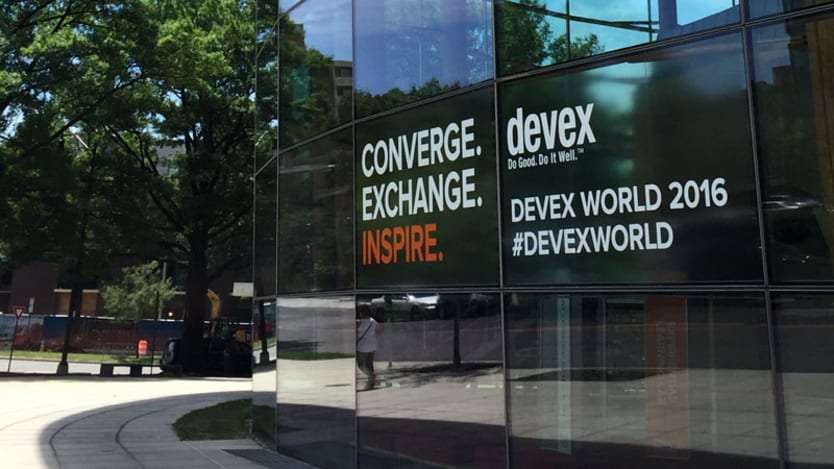
Today, more than 300 organizations will gather at The Mead Center for American Theater in Washington, D.C., for Devex World. Organizations from xPrize to Uber, Cordaid to Oxfam, Malala Fund to Omidyar Network will be there, along with some of development’s leading voices — Ben Rhodes, Gayle Smith, Ellen Stofan, Pam Scott and Michael Faye. The daylong event will explore groundbreaking technology, new partnership models, an evolving development-humanitarian dynamic, and how key institutions are adapting to a future that’s already here.
Devex will keep you up to date on what’s happening throughout the day. On Twitter, Facebook and Instagram, we’ll give you an inside look at how business is transforming development; what it means to innovate at scale; how to move from telling stories to building movements; and what new funding models mean for an evolving development ecosystem.
You can read the full program here and stay tuned for live updates.
6:58 p.m.
USAID’s Gayle Smith: ‘Hopefully we’re always in a new era’
By Naki Mendoza, Devex Impact reporter
The daylong drumbeat has been about the new era of development — echoed one final time by the U.S. government’s top development official. “Hopefully we’re always in a new era,” said Gayle Smith, the U.S. Agency for International Development’s administrator, in the closing session of Devex World. But today’s landscape is characterized by a much richer menu of options for countries to pursue their development goals, a wider array of partners — necessarily so because of the government’s budgetary constraints — and, overall, more tools on hand to “do” development. All told, having a broader toolkit to pursue development makes what were previously considered agency-critical issues just a decade ago seem like a walk in the park today, said Smith.
Is the new landscape as profound for other donors, funders and development implementers? Just what does it mean to be in this new era? The industry is generally shifting toward a results-based ecosystem, Devex President Raj Kumar noted on the closing panel that he moderated. It means less measurements based on money spent and more on measuring impact, metrics and results related to social change. Pam Scott, the founder and chief executive of the Curious Company whose work focuses on a human-centered design to development, put forward one novel way to measure progress toward social change: failure. Of course, the goal is for development innovations to render successful interventions. But the more innovations that fail at least mean that more models are being continuously tried and tested. “I don’t want to fail in two years, I want to fail in two days — two weeks max,” said Scott. “Let’s get ideas out there more quickly, let’s reframe failure as part of the process, but earlier.”
The idea holds virtue, but in practice may still not sit entirely well with donors. Other closing session panelist from the Pfizer Foundation, RTI and Innovation for Poverty Action admit that traditional donors still tiptoe around the concept of failed or unsuccessful investments. For a major shift in development to take hold, the question then, perhaps, falls on how to get donors, implementers and project stakeholders to fully embrace the high risks that necessarily come with the rewards of development innovations.
6:05 p.m.
What comes next for humanitarian reform?
By Elizabeth Dickinson, Devex associate editor
International Rescue Committee President and CEO David Miliband closed the day for Devex World in a conversation with Devex’s Michael Igoe, focusing on the immediate challenges facing the humanitarian sector. Relief efforts are increasingly stretched as global crises grow more protracted and the political system set up to solve them fracture.
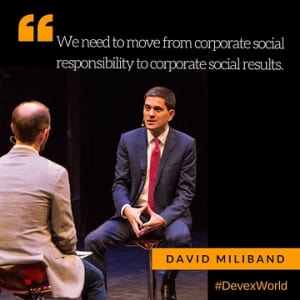
With 60 million people now affected by conflict — 20 million of them refugees — Miliband called for a wide-ranging public debate for one of the most important, but under-covered elections later this fall: the position of U.N. secretary general. “The needs of the one in every 120 people on planet [who are displaced] have to be center stage in the auditions and job interviews for this role,” he told the audience.
In the meantime, the humanitarian sector can boost efficiency by agreeing on some common outcomes to strive for — the same sort of standards that have helped galvanize evaluation, monitoring and innovation in the development community.
Over the past 10 years, he pointed out, we’ve made incredible gains in stable settings. Millions have climbed out of poverty in places such as India and China. But the “geography of poverty,” as he put it, is changing rapidly: many of the neediest are now in fragile and conflict-affected states. So now more than ever is “not a time for development and humanitarian communities to cleave apart,” Miliband said. “We’ve got to get rid of false categories” to help those most in need.
5:50 p.m.

Adva Saldinger and Ellen Stofan
National Aeronautics and Space Administration Chief Scientist Ellen Stofan spoke with Devex Associate Editor Adva Saldinger about how satellite technology and data collection can impact global development work.
Stofan stressed that NASA is prioritizing making data available to aid workers and development professionals engaged in pressing challenges such as climate change.
4:57 p.m.

4:36 p.m.
The closing panel is underway here at Devex World. Dr. Nahid Bhadelia from National Emerging Infectious Diseases Laboratory tells her story of fighting Ebola on the front lines. Coming up, Devex CEO Raj Kumar hosts a panel on the shifting role of institutions, Devex associate editor Adva Saldinger sits down with NASA Chief Scientist Ellen Stofan, and Devex reporter Michael Igoe interviews IRC’s David Miliband.
4:07 p.m.
Watch this Facebook Live interview with Devex's Naki Mendoza Live and Pam Scott, member of the Maverick Collective.

3:35 p.m.
Democratizing philanthropy with new funding models
By Jeff Tyson, Devex reporter
The world’s global development donors aren’t just made up of multilateral organizations, bilateral aid agencies and billionaires — although those players are important. The everyday person is another critical resource of funds for the world’s toughest global development challenges and the development community needs to do a better job of leveraging that community of givers, according to Scott Jackson, president and CEO of Global Impact.
Jackson stressed there is an opportunity to democratize philanthropy — to allow the everyday person to give strategically based on their own passions. Jackson’s own organization encourages individuals to establish their own foundation with no minimum level of giving.
“We have to begin to be the onramp for individuals [passionate about an issue],” Jackson said in an interview with Devex Associate Editor Adva Saldinger.
Jackson added that tech platforms, mutual funds, donor circles and investment circles can be tools that help to support the individual donor.

3:16 p.m.
Innovating at scale
By Catherine Cheney, Devex reporter
Three speakers from very different backgrounds each drove home the point that when the customers are not buying the products or services they are receiving, then the people developing the products and services need to move beyond good intentions to meet the needs of the people they aim to serve.
In a panel that included the founder of the product verification service Sproxil, a venture capitalist at Khosla Impact, and the chief philanthropy officer at Vulcan Inc., Devex associate editor Elizabeth Dickinson opened with a story about hospital refrigerators being used to store pineapples instead of medicines.
Backstage, Tony Banbury — who recently transitioned from leading the Ebola response for the United Nations to extending the philanthropy of Microsoft billionaire Paul Allen in areas including conservation and ocean health — shared a related story about his first job with the United Nations. On the border between Thailand and Cambodia, the response to a rat problem in a refugee camp was to offer a bounty for rat tails, until people started breeding rats and raking it in.
When global development professionals simply assume what the people they aim to serve want and need, the outcomes can include storing pineapples in hospital refrigerators, breeding rats for a tail bounty, or other endless examples of money and time and opportunity wasted.
"What doesn't exist but should?" Banbury asked Devex, quoting the question Allen asks to guide his philanthropy. "Lots of folks can write a check, but it's creativity and innovation and that drive to find a better way to solve a problem behind this question that keeps me up at night."
As Banbury settles into his new role in Seattle, and thinks about how to leverage the tremendous resources Allen can make available — including the $100 million he committed to the Ebola response — the question becomes how to apply those resources in such a way that products and services meet actual needs and make a meaningful impact.
2:50 p.m.
Imagine an online marketplace where innovators, entrepreneurs and investors can come together to collaborate and scale innovations for global good. That is exactly what the new Global Innovation Exchange, announced today at Devex World, aims to do. A partnership between the United States Agency for International Development, Australia's Department of Foreign Affairs and Trade, and the Korea International Cooperation Agency, the exchange is a free, nonbranded platform aggregating thousands of innovations around the world and connecting them with funding opportunities, collaborators and experts.
Watch this Facebook Live interview with Devex's Kate Warren and USAID's chief of applied innovation and acceleration, Alexis Bonnell, to learn more and find out how you can get involved.

2:44 p.m.
Live from the Innovation Space at Devex World
By Naki Mendoza, Devex Impact reporter

A village at the foot of Mt. Kilimanjaro and a Syrian refugee camp in Jordan — travel to both from the Innovation Space at Devex World via virtual reality. The ONE Campaign and United Nations Development Program are taking participants on VR tours to these corners of world. As part of their advocacy, they are using the special effects of VR to go beyond gaming and entertainment to influence development policy. The ONE Campaign, for example, is utilizing VR as a modern-day lobbying tool. When meeting with members of Congress or Parliament, “we don’t bring them pamphlets, we bring them VR,” said Ryan Donovan, a creative producer for ONE. “We can bring them to Africa in two seconds to highlight an issue that the numbers can quantify but can never truly get to the core of.”
2:32 p.m.
At the Innovating at Scale Plenary, Catherine Cheney talks to Bob Schukai from Thomson Reuters. Innovation is a buzzword in the global development community. But simply because it’s overused, that doesn’t mean it’s unimportant. In fact, it’s vital, but we have a hard time creating innovation and an even harder time connecting innovations to large scale problems.
1:46 p.m.
Via Twitter
1:42 p.m.
Debra Messing, Global Health Ambassador for PSI, sits down with Devex’s Carine Umuhumuza to kick off the Storytelling to Movement Building plenary. We’ll also hear from people who have taken stories and turned them into action: Mitchell Toomey from U.N. Millennium Campaign/UNDP; PATH’s Amie Batson; Jaha Dukureh from Safe Hands for Girls; and Tom Hart from the ONE Campaign.
1:04 p.m.
@devex's Adva Saldinger is sitting down with @TonyElumeluFDN's @ParminderVir
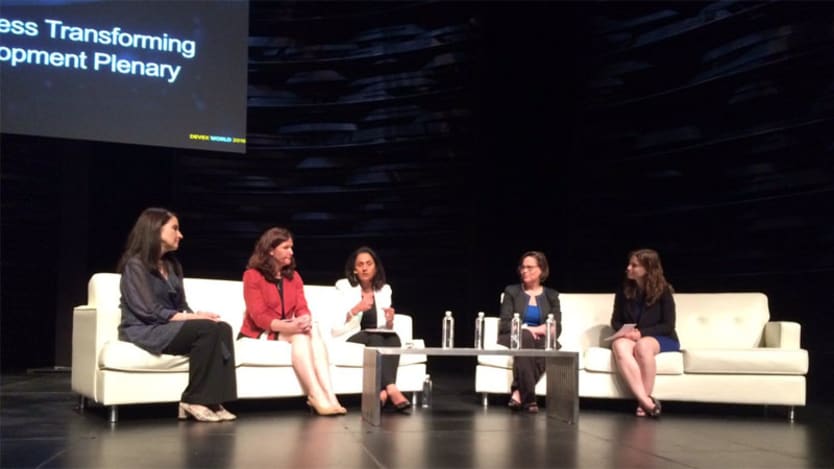
12:51 p.m.
Talent is universal, but opportunity is not
By Catherine Cheney, Devex reporter
Across the four tracks at Devex World, one word has come up over and over: Opportunity. On two stages, Christina Sass from Andela and Sid Mofya from Draper Venture Network both delivered more or less the same message as part of their talks. While talent is universal, they said, opportunity is not.
"The business of providing opportunity is great business," said Mofya, who works with a network of venture capital firms around the world and invests in companies providing opportunities for others at a profit.
He mentioned Wobe, an Indonesian business that offers mobile business and finance tools for Southeast Asian women, Thread International, which works in Haiti and Honduras to turn trash into fabric, and Jamalon, an online bookstore in the Middle East often called the Arab Amazon.
Sass and her two cofounders at Andela have attracted significant venture capital themselves. At Devex World, Sass explained why and how Andela is making opportunity their business, and her talk echoed some of the points that Mofya made in his session, including how business makes opportunity sustainable.
Jehiel Oliver — the founder and CEO of Hello Tractor and another speaker at Devex World — made the point that beyond the impact startup businesses with social missions can have, job creation is a benefit across the board.
Entrepreneurs are well positioned to seize the opportunity of opportunity, and the role the development community can play to support these efforts will also be a key focus at the Global Entrepreneurship Summit, where many of these Devex World Speakers will gather next week, taking their message to Silicon Valley.
Coming up here at Devex World, we will hear from Sandhya Hegde of Khosla Impact, another Silicon Valley based venture capitalist who is investing in opportunity in emerging markets.
12:21 p.m.
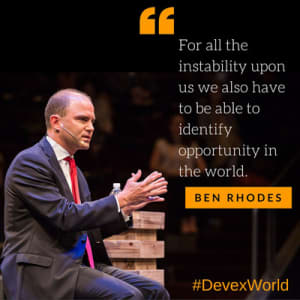
11:43 a.m.
A ‘new world’ for breaking barriers
By Naki B. Mendoza, Devex Impact reporter
A combat marine-turned-social entrepreneur and a Wall Street banker who now runs the world’s largest environmental organization — the new global development ecosystem may very well see more of these hybrid experiences.
Seven years ago Jake Harriman was serving a tour of duty in the danger zones of Iraq, until a deadly exchange of fire with insurgents upended things. The roadside shootout left several dead, among them the wife and daughter of an Iraqi farmer who was inauspiciously caught in the crossfire. It left a searing impression on Harriman about U.S. foreign policy. There was — and still is — in his view, insufficient resources for empowering the poor communities in fragile states. As a result, terrorist groups such as al-Qaida, the Taliban and now Islamic State group raise national security alerts in the West, but in their own way also represent a form of competition for development organizations through their influence in those poor communities. Shortly after the incident, Harriman left the marines and founded Nuru International, a social enterprises that goes deep into fragile communities to build locally driven solutions to poverty.
Mark Tercek, a 25-year veteran of Wall Street giant Goldman Sachs, left the cushy fortunes of investment banking to go into another form of asset management — environmental capital. “Natural capital,” as the Nature Conservancy where he serves as chief executive describes it, is the practice of valuing nature and creating incentives to invest in it. Doing so applies many of the same principles and tactics as investing in traditional financial capital. “If nature is an asset, are we investing enough to protect it?” goes one of the Nature Conservancy’s core mantras. In practice, it can mean pooling various streams of capital to build a mile-long oyster reef in the Gulf of Mexico. The cost is roughly the same as building a seawall of the equal size to guard coastlines from storm surge. Yet, whereas a seawall is prone to erosion and depreciation, an oyster wall offers similar storm protection, but through its provision of food and natural resources, is an appreciating asset.
Both Harriman and Tercek headlined the opening session of Devex World. A central theme of Devex’s inaugural event is the “new world” of development that breaks barriers between traditional and nontraditional actors in the development industry. Partnerships and collaboration across public, private and civil society sectors are the new norm. By extension, development is no longer siloed as its own standalone practice. It will increasingly integrate a variety of industries and disciplines — from security to climate change and finance to agriculture — to meet the global development goals. A range of crosscutting experiences between sectors such as Harriman and Tercek’s will inevitably enhance the way development is done.
11:33 a.m.
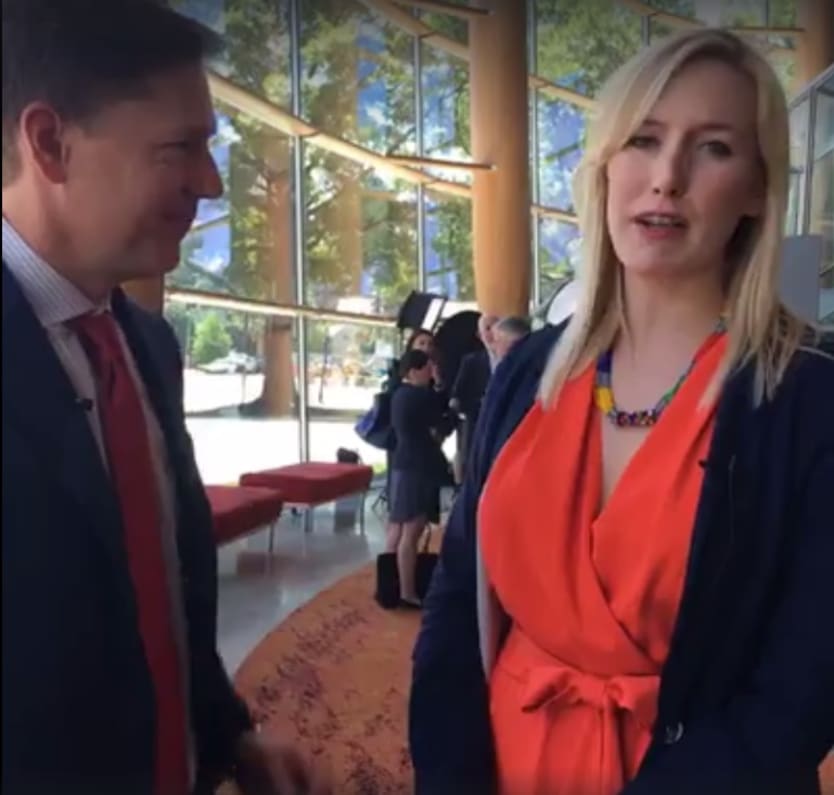
Kevin Martin, vice president for mobile and global access policy at Facebook, talks to Devex reporter Catherine Cheney about the social media giant’s global connectivity efforts.
11:20 a.m.
At the Data Revolution session, panelists are diving into how data is fundamentally transforming monitoring and evaluation. Experts and thought leaders include USAID’s Ann Mei Chang, Kevin Martin from Facebook, and Lauren Woodman from NetHope.
10:21 a.m.

Nuru International founder Jake Harriman chats with Devex reporter Michael Igoe after he tells his story of being in the special armed forces and how he uses that in his work in fragile states.
10:05 a.m.

9:44 a.m.
9:39 a.m.
9:34 a.m.
9:28 a.m.
How Uber is rewriting the rules of transportation
By Elizabeth Dickinson, Devex associate editor
Uber’s international chief Matt Devlin and Julie Hanna of Kiva take the stage to recall how their audacious ideas of scale have reshaped the role of the public in social development.
Uber is rewriting the rules of transportation in cities such as Lagos and Cairo. By identifying commuters who are all traveling in the same directions, the platform has enabled carpooling on demand. In fact, 300 million new Uber users chose Uber Pool for their first ride — a sign of the underserved demand for affordable, shared transport.
The power of crowds has also been harnessed for funding, loans and access to credit for 2 million entrepreneurs through the Kiva platform. Hanna recalls the skepticism from investors ten years ago who found it a “laughable idea’ that strangers would want to lend to entrepreneurs a world away. Fast-forward now, and the repayment rates on Kiva’s loans are 97 percent and crowdfunding more broadly will reach approximately $100 billion this year.
Bold ideas and innovations reach the world’s largest untapped market — the half the global population who still live on just dollars a day, says Hanna. They’ve done that through the power of the mobile phone, among other things.
“We hold in our hands the most powerful tools in the history of humankind,” says Hanna. “And yet we’re faced with humanity’s most intractable challenges. We have an opportunity to harness the tools to address [them].”
9:10 a.m.
‘Use all the tools’
By Elizabeth Dickinson, Devex associate editor
Chief technology officer of the United States Megan Smith’s message for the development community: “Use all the tools.” Whether it’s data or storytelling, artificial intelligence or engineering, development needs to be innovative first and foremost in its model for crafting policy.
Smith urges the community to “add a chair to the table” for the tech-savvy in conversations about development. Instead of making a policy decision and then asking a technologist to help implement it, bring those experts into the conversation about how to craft the intervention itself.
“The more you get people who are already fluent in this, get into the room and help you solve things,” she tells the audience. “Bring them into this space.”
8:40 a.m.
The event is kicking off with remarks from Devex President and Editor-in-Chief Raj Kumar about this new era in global development and the expanding circle and industry of global development.
We’ll hear from key luminaries across the international development industry, including: Matt Devlin from Uber; Julie Hanna from Kiva; Jehiel Oliver from Hello Tractor; Ben Rhodes and Megan Smith from the White House; and Mark Tercek from The Nature Conservancy. Follow Raj Kumar, Catherine Cheney and Richard Jones as they guide the discussion.
But first let’s step back and consider this new era of global development.
The state of global development today
The progress is indisputable, and so is the role development professionals have played in achieving it. Health indicators and income levels are improving. We have a global agreement to end extreme poverty — and can imagine getting it done.
“We are having conversations about disease that would have been unheard of 10 years ago,” said PATH CEO Steve Davis. “We are actually moving into a world where elimination of diseases and potential eradication is something we are actively talking about.”
But in addition to the progress we’ve seen the development community achieve, so is that community progressing. With every new partnership between an architect and a relief organization, between entrepreneurs from Nairobi and Silicon Valley accelerators, between public donors and emerging philanthropists, the development community grows more diverse, more inclusive, more creative, and better suited to tackle the complex challenges and opportunities we face.
“International development is not just for development practitioners anymore,” said Aaron Williams, executive vice president of government relations and corporate communications, who will speak at Devex World. “The development sector’s path forward is being blazed by an innovative, diverse and optimistic mix of professionals who are set apart by different talents and expertise, and united around a common commitment to improving lives in developing countries around the world.”
With Devex World we aim to draw a bigger circle around global development, not just by saying that philanthropy is important, but by asking — as Devex World speaker and Global Impact President and CEO Scott Jackson has — how can technology empower new generations of philanthropists with the same tools the Bill & Melinda Gates Foundation brings to bear on global challenges?
When it comes to technology’s role in development, it can be easy to focus on the newest gadget or app. But when technology shifts the way economies work and societies operate the questions are bigger and more essential than that. How might technology change the experience of living as a refugee? How can it improve the relationship between patients and doctors in under-resourced places? The development community’s work is too important to be anywhere other than ahead of the curve in understanding and acting on the potential of new ideas to improve lives.
Of course we can still enjoy some of the gadgets. At Devex World you might encounter a roaming robot, and our experimental learning labs will allow participants to interact with some of the products at the leading edge of development technology. But these technologies are more than just interesting; they will change how we work and learn from our work.
Follow the event
Follow Devex moderators:
We know not everyone can join us in Washington, D.C., but we hope you’ll join us in conversation online, through our live coverage and on social media.
At an event full of the thinkers and doers, change-makers and expert practitioners who make global development happen, we’ll bring you updates on Twitter, live interviews on Facebook, a backstage glimpse on Instagram, and running analysis on our website. Be sure to follow @devex and our reporters who will moderate and report from the live events.
This is a new era of global development, and we hope Devex World will help mark, celebrate, and chart the course for a bigger, bolder, and more diverse development community. One way or another, we hope you’ll join us, and as always, stay tuned for more coverage.
Follow Focus On: Devex World for more conversations emerging from the global development event of the year.
Read more from Catherine Cheney on this topic:
► Can coding become a building block of global education?
► The 'internet of things' is narrowing the gap between data and action







